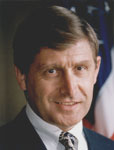Martin Baily | |
|---|---|
 | |
| Chair of the Council of Economic Advisers | |
| In office August 12, 1999 – January 20, 2001 | |
| President | Bill Clinton |
| Preceded by | Janet Yellen |
| Succeeded by | Glenn Hubbard |
| Personal details | |
| Born | March 29, 1949 Exeter, England, UK |
| Political party | Democratic |
| Spouse | Vickie Baily |
| Children | 4 |
| Education | King's College, Cambridge (BA) Massachusetts Institute of Technology (MA, PhD) |
Martin Neil Baily (born January 13 1945) is an economist at the Brookings Institution and formerly at the Peterson Institute. He is best known for his work on productivity and competitiveness and for his tenure as a cabinet member[1][2] during the Clinton Administration. He was one of three members of the Council of Economic Advisers from 1994 to 1996, and chairman of the Council from 1999 to 2001. [3] He currently co-chairs the Bipartisan Policy Center's Financial Regulatory Reform Initiative and serves as a senior advisor at Albright Stonebridge Group.
Baily was a senior fellow at the Brookings Institution (1979–89) and subsequently professor of economics at the University of Maryland (1989–96). He was vice chairman of a National Academy of Sciences – National Research Council panel investigating the effect of computers on productivity. Baily co-founded the microeconomics issues of the Brookings Papers on Economic Activity. He was a principal at McKinsey & Company's Global Institute (1996–99) and has been a senior adviser to McKinsey since 2002. He joined the board of The Phoenix Companies in 2005 and is an academic adviser to the Congressional Budget Office and associate editor of the Journal of Economic Perspectives.[citation needed]
Baily earned his Ph.D. in economics at the Massachusetts Institute of Technology (MIT) and his undergraduate degree at Cambridge University (UK), and taught at MIT and Yale University. He is the author of numerous books and articles and coauthor with Jacob Kirkegaard of Transforming the European Economy (2004).[citation needed]
- ^ "Martin Neil Baily". Brookings. 2016-03-31. Retrieved 2020-01-20.
- ^ "Newsroom". PIIE. 2016-02-02. Retrieved 2020-01-20.
- ^ "Former Chairs of the Council of Economic Advisers". The White House. Retrieved 2020-01-20.